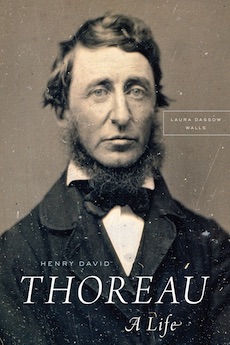Winner of the 2018 Christian Gauss Award
By Louis J. Kern
“I went to the woods,” Thoreau wrote, “because I wanted to live deliberately . . . to live deep and suck all the marrow out of life . . . .” But his Walden Pond house, as Walls makes clear, was not a retreat from society nor was he a hermit. Curious townspeople visited, he entertained friends there, frequently visited his and the Emerson family, and the Boston-Fitchburg Railroad ran along the pond’s opposing shoreline. Though this biography seeks to present Thoreau the writer, it is a richly textured consideration of a man at once very much part of the common life of his time while nostalgic for a simpler era, and critical, though not unaccepting, of modernity—industrialization and commercial capitalism.
Walls presents a fully fleshed-out portrait of Thoreau: an ardent walker who enjoyed long daily rambles and mountain hikes; an inventor and engineer who developed improved methods of pencil manufacture in his family’s factory; a naturalist and early eco-conservationist who advocated the establishment of national parks and the protection of wildlife; a writer who produced four books (two published posthumously), classic essays (“Slavery in Massachusetts,” 1845, and “Resistance to Civil Government,” 1849), a 14-volume journal, notebooks, and a wide correspondence; and an accomplished botanist, member of the Boston Society of Natural History and the American Association for the Advancement of Science (1850).
Unlike Emerson who had financial independence, Thoreau struggled as the youngest son of a large extended family. In order to meet publication costs and make a living, he pursued speaking engagements, worked as a handyman, carpenter, and in the pencil factory, taught in the village school, and became a talented surveyor and civil engineer, all of which drew him away from his beloved natural world.
Thoreau was as at ease with the common farming folk as with the literary community. Emerson, a lifelong friend, introduced him to Transcendentalism and the religious texts of the East, and he profited from his acquaintance with Margaret Fuller, Nathaniel Hawthorne, and Bronson Alcott. While contemporaries often saw Thoreau as an epigone of Emerson, he was no facile idealist; rather, his experience made him a radical pragmatist.
He served as a conductor on the Underground Railroad, was a powerful proponent of abolition, and penned the fiery “Plea for Captain John Brown” (1859). Walls writes, some considered him among the “era’s greatest reform speakers”. He was fascinated by Native American history and customs, maintaining a separate Indian notebook, and as a gifted linguist he sought to learn Wampanoag. He admired the way native peoples lived fully within nature, shaping and nurturing the commons and in turn shaped and nurtured by it. Their relationship to nature was an essential element of his emerging ecological consciousness.
Walls’ biography gives us a portrait of a complex man, at once writer, philosopher, and spiritual seeker and day-to-day fellow about Concord. She demystifies him by revealing the six-week summer sojourn in a cabin on Flint’s Pond with Charles Stearns Wheeler (1837), a prototype of the 26-month Walden sojourn, and Bronson Alcott’s poll tax repudiation and imprisonment that preceded Thoreau’s. On the other hand, she enhances his scientific reputation by emphasizing his refutation of the immutability of species and of spontaneous generation of plants by establishing their propagation via seeds, insights inspired by Darwin’s Origin of Species. Characteristically, Thoreau accurately read its social implications as a refutation of racism and slavery. (For a fuller discussion of Thoreau’s botanical contribution see Walls’ Seeing New Worlds: Henry David Thoreau and Nineteenth-Century Natural Science,1995).
This is a refreshingly original biography that may well stand as the definitive treatment of its subject for this generation.
Louis J. Kern (ΦBK, Clark University,1965) is professor emeritus of history at Hofstra University. Hofstra University is home to the Omega of New York chapter of Phi Beta Kappa.




